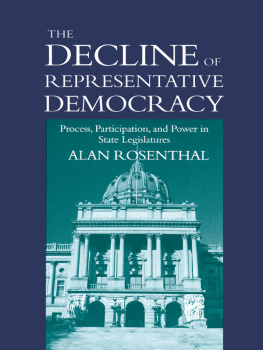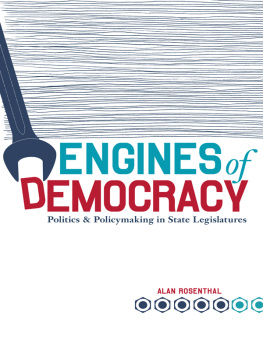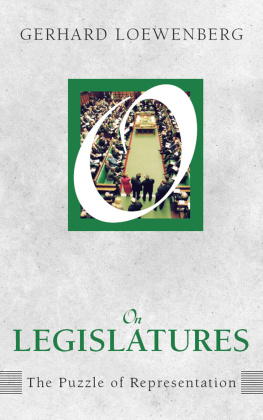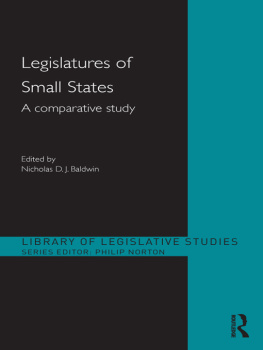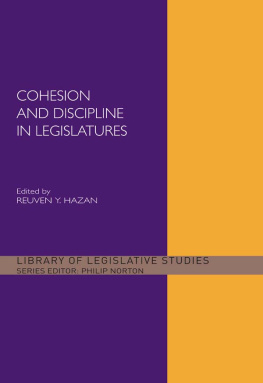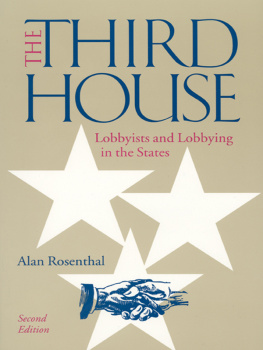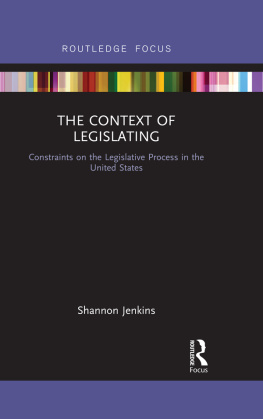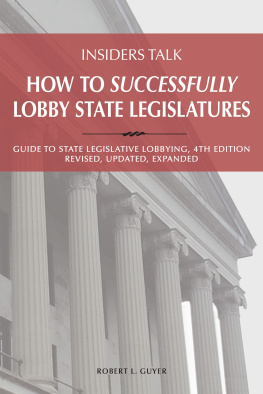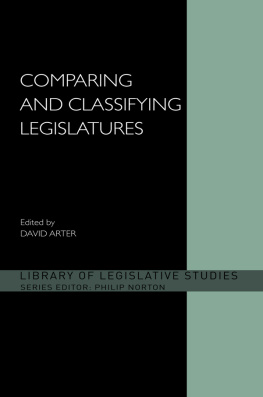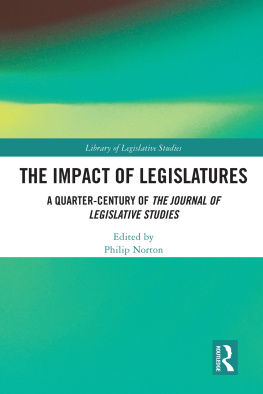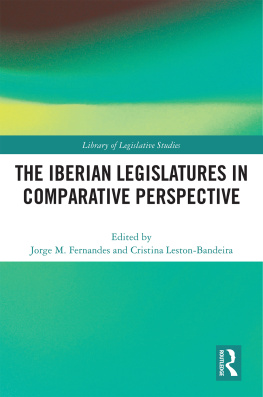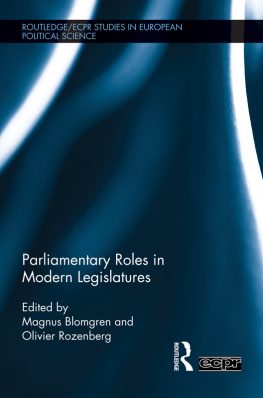Additional praise for The Decline of Representative Democracy by Alan Rosenthal
This book does an admirable job of providing a comprehensive yet interesting view of the current state of state legislatures, as well as a compelling argument for why they find themselves in their current state. Rosenthal is to be commended for making abstract notions about representation relevant [to readers] by tying them to the actions of state legislators, and by bringing into the discussion the move toward expanding mechanisms of direct democracy.
Peverill Squire
The University of Iowa
This is a thought-provoking book that should be required reading for those who want to understand the nature of state legislatures in the 1990s.
Keith E. Hamm
Rice University
Given that the last comprehensive discussion of the state legislature was written almost twenty years ago, and also penned by Rosenthal, The Decline of Representative Democracy is long overdue.
Thomas H. Little
The University of Texas at Arlington
THE DECLINE OF REPRESENTATIVE DEMOCRACY
Process, Participation, and Power in State Legislatures
Alan Rosenthal
RUTGERS UNIVERSITY
A Division of Congressional Quarterly Inc.
Washington, D.C.
To Vivian
who expanded my horizons
Copyright 1998 Congressional Quarterly Inc.
1414 22nd Street, N.W., Washington, D.C. 20037
All rights reserved. No part of this publication may be reproduced or transmitted in any form or by any means, electronic or mechanical, including photocopy, recording, or any information storage and retrieval system, without permission in writing from the publisher.
Printed in the United States of America
Third Printing
Cover design: Naylor Design Inc.
Library of Congress Cataloging-in-Publication Data
Rosenthal, Alan
The decline of representative democracy : process, participation, and power in state legislatures / Alan Rosenthal.
p. cm.
Includes bibliographical references and index.
ISBN 0-87187-975-1 (cloth : alk. paper).ISBN 0-87187-974-3 (pbk. : alk. paper)
1. Legislative bodiesUnited StatesStates. 2. State governmentsUnited States. I. Title.
JK2488.R658 1997
05 04 03 02 01 5 4 3
Preface
I have spent most of my professional career observing legislatures, trying to figure out how they work, why they function as they do, and what they mean in a political system built around representative democracy. No matter how long and how hard I have looked, I still have not succeeded in nailing things down. But I keep trying.
This book reports on my latest attempt to figure legislatures out and discern where they are headed. It is a product of a confluence of factors.
One factor that led to the present enterprise was my book, Legislative Life, which was published in 1981, years after I arrived at the Eagleton Institute of Politics to begin my association with state legislatures. Legislative Life described the processes and politics of state legislatures, focusing on individual behavior and institutional performance. Its purpose was to inform legislators and legislative staff, as well as interns and undergraduate and graduate students in political science. From all accounts, it fulfilled its purpose. After it went out of print and was no longer available, a number of my colleagues in political science who had used the book in their courses inquired as to whether I would be preparing a new edition. For years, I fended them off.
The present volume is by no means a revision of Legislative Life. It is a completely new book; yet it covers some of the same ground and has comparable objectives. My hope is that, like its predecessor, it will be used as a text that offers a comprehensive overview for practitioners and students alike.
Another factor that is responsible for this book relates to my efforts in the area of legislative modernization and reform, and principally those that have been supported by the Carnegie Corporation. Thanks to Carnegie, Eagleton conducted an annual retreat for specially selected legislators from 1966 to 1975. The subject of five days of seminars in Florida each summer was legislative reform and modernization. Over the course of the ten years, a total of 432 outstanding legislators from the fifty states participated. In 1990 Carnegie funded a follow-up program, one in which a number of alumni of the conferences came together in Williamsburg, Virginia. Background papers were prepared by several legislative scholars, including Malcolm Jewell of the University of Kentucky; Karl Kurtz of the National Conference of State Legislatures; and Burdett Loomis of the University of Kansas. Discussion by participants focused on changes in the composition of the legislature, the development of legislative capacity, the professionalization of legislative bodies, and the impact of campaigns and elections. Our intention was to publish a book assessing state legislatures and drawing on the Williamsburg materials. This assessment of the state of state legislatures is designed in part to accomplish that projects goal.
The final factor to which this volume can be credited is the recent democratic trend in and around state legislatures. Despite the popular perceptions that legislatures are autocratic, arbitrary, isolated, unresponsive, and up for sale, legislatures are in fact extraordinarily democratic institutions. They have been becoming more democratic of late, so that a systemic shift from representative democracy to participatory democracy now seems to be under way. This change and its implications are the thematic focus of this book.
The Decline of Representative Democracy was an easier book to write than Legislative Life, mainly because of the remarkable progress made in the field of state legislative research. The literature today is far richer than it was fifteen years ago. Much of the advance can be attributed to the intellectual leadership of Malcolm Jewell and to those political scientists who have been following in his scholarly footsteps. The University of Nebraska series, Politics and Governments of the American States, edited by John Kincaid, also deserves credit. Thanks to the volumes in this series, we currently have basic and essential information on legislatures in one-third of the states. Anyone writing in the field thus has a solid base on which to build. I have built on it.
Much of what is reported here derives from interviews I conducted especially for this study. These interviews were with legislators and legislative staff in five states: California, Florida, Maryland, New Mexico, and Ohio. I quote, paraphrase, and refer to these interviews and cite them in notes, but I do not name those who were interviewed. As far as my argument is concerned, it is not necessary for individuals to be identified; as far as the respondents are concerned, it cannot hurt for them to remain anonymous.

